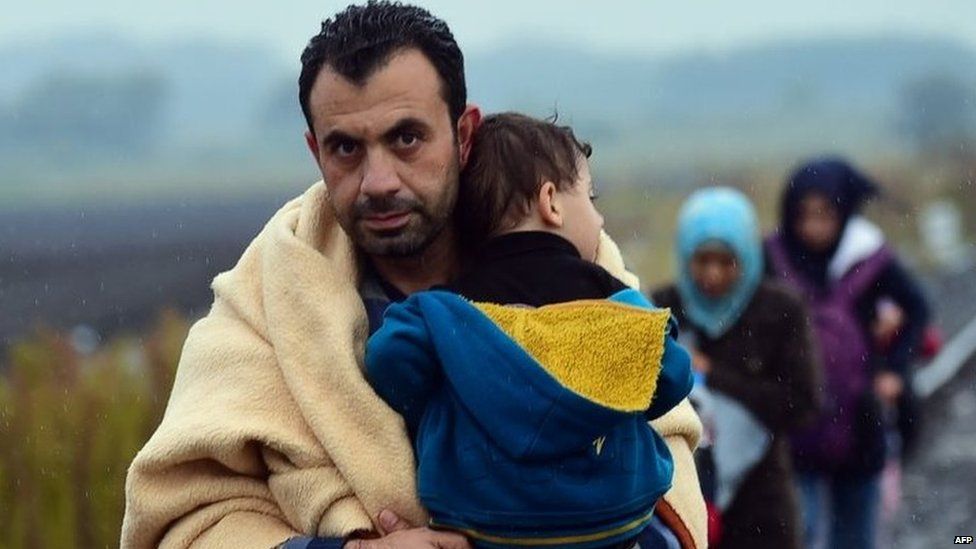Migrant crisis: Key talks in Prague amid quota row - BBC News
 Image copyrightAFPImage caption The authorities in Hungary have been warned to expect 40,000 more migrants by next week
Image copyrightAFPImage caption The authorities in Hungary have been warned to expect 40,000 more migrants by next week The foreign ministers of four Central European nations are to meet their counterparts from Germany and current EU presidency holder Luxembourg, amid a growing row over migrant quotas.
The Czech Republic, Hungary, Poland and Slovakia reject quotas proposed by the EU Commission and backed by Germany.
The talks in Prague are expected to focus on this issue.
The Commission wants 120,000 additional asylum seekers per year to be shared out between 28 members.
This would be a sharp increase from the current 40,000.
In recent weeks, tens of thousands of migrants have been desperately trying to flee conflicts in countries like Syria and Libya. Many of them travel through Hungary to Germany, Austria and Sweden - wealthier EU nations with more liberal asylum laws.
Europe migrant crisis: Are you affected?
What next for Germany's asylum seekers?
What can the EU do to solve the crisis?
'Differing views'
The Central European nations - the so-called Visegrad-four - have all rejected the proposed compulsory quotas.
Image copyrightAPImage caption Hungary's razor-wire fence has so far failed to stop thousands of people getting through from Serbia Image copyrightAFPImage caption Many migrants start they perilous journey from Turkey - crossing the sea to Greek islandsThis is despite the fact that each of them would take in far fewer refugees than Germany if the EU backs the proposals.
Ahead of the Prague meeting, the Czech Foreign Ministry said it was aimed at improving "better mutual understanding among EU member states... [in light of] some differing views".
Hungary in particular has become a key point on the journey north for the migrants, with more than 150,000 people arriving this year.
On Wednesday, the Hungarian army started military exercises to prepare for a possible future role in guarding the border and stemming the flow of people - a move criticised by human rights groups.
A new razor-wire barrier is also being built along the country's border with Serbia.
The authorities in Hungary have been told to expect 40,000 more migrants by next week.
In other developments:
- President Barack Obama's spokesman has confirmed the US will increase its refugee intake from Syria to at least 10,000 in 2016. America has so far accepted 1,500
- Ireland says it will take in 4,000 refugees, including 1,120 people it had already agreed to receive
- The UK says it will resettle 20,000 Syrian refugees from camps surrounding Syria by 2020
Syrian criticism
On Wednesday, European Commission President Jean-Claude Juncker announced plans to distribute 120,000 refugees from Greece, Italy and Hungary among member states via binding quotas.
This would be on top of a proposal in May to share 40,000 refugees from just Greece and Italy.
The European parliament backed Mr Juncker's plans on Thursday and they will now have to get the go-ahead from member states.
Meanwhile, Syria's Information Minister Omran al-Zoubi said in rare comments on the issue that Europe should bear full responsibility for the crisis, adding that most Syrians who had left were fleeing areas held by the government's rivals, including Islamic State (IS).
He criticised European countries for sending "terrorists" to his country, referring to the thousands of Europeans who have travelled to Syria and Iraq to fight with IS.
BBC correspondents covering the migrant crisis on Twitter
- Lyse Doucet at the Macedonia-Greece border: "Ahmed & cousins from #Aleppo hoping to find body of brother who drowned in #Greece."
- Anna Holligan at Roszke on the Hungarian border: "Relentless flow of people.. #Hungary's response, send in the troops"
- Bethany Bell in Nickelsdorf, Austria: "Bottleneck to get on buses at Austrian border. Families trying not to get separated. Buses all going to train station"
A note on terminology: The BBC uses the term migrant to refer to all people on the move who have yet to complete the legal process of claiming asylum. This group includes people fleeing war-torn countries such as Syria, who are likely to be granted refugee status, as well as people who are seeking jobs and better lives, who governments are likely to rule are economic migrants.